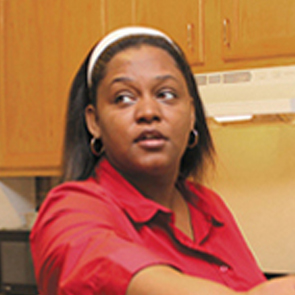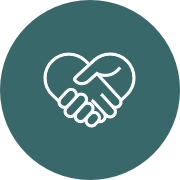
‘All I wanted was to live a normal life’
It began with one person in need.
His name was Tyrone. No human services agency would touch him.
“He couldn’t live with anybody else,” said RHD’s Jeff Walder. “He was the most notorious person in Philadelphia. He was feared by everybody.”
But Walder and RHD came up with a bold idea to allow Tyrone to lead a fulfilling life.
“When I told people who knew Tyrone that RHD wanted to put him in his own apartment with flexible case management support, they said: What are you, nuts?’ ” Walder said. “They laughed at me.”
But soon Tyrone was one of the great success stories of a program that became Supported Adult Living Teams (SALT), living in his own apartment with a staff that checked in on him as needed instead of being around him 24/7. And state and local agencies began pushing more and more people to the program.
Ever since, SALT has been helping people with serious mental illness thrive while living independently without around-the-clock case managers.
“We’re talking about people they used to have in restraints, watched 24/7,” Walder said. “Well, that’s what causes and exacerbates their problems.
“We decided to let them be themselves, be in a secure environment. Let them be who they are, instead of being told what to do and when to do it. They get their meds, they get their support. Everybody thought it was going to be really tough to pull off. But at RHD, they said: Go ahead and try it.”
Established in 1995 by RHD and led by Walder and Donna Kueny, SALT helps clients gain independence and freedom. Some come into the office for day programs regularly. Some see case managers frequently. But some see them as little as once a month.
“We’ll take people other places don’t want to take, or don’t know how to handle,” Walder said. “We’ve found people who were hospitalized 24/7/365 – and we’ve walked in, and taken them out, and they’ve never returned to the hospital. You put them in a situation where they can be themselves, and we’re had people go back to their professions, take classes at the community college, reunite with their families.”
At RHD SALT of Passaic County in New Jersey (founded in 2003), a study by Kenneth Gill, Ph.D., a professor at the University of Medicine and Dentistry of New Jersey found that hospitalizations were down to 7 percent, and 82 percent of residents were reported to be “completely independent” with their medication. The University of North Carolina/Wilmington has studied the SALT program there since its inception and found a wonderful success story.
“You’re talking about people who were put in mental hospitals here who were basically being stored, just treated miserably, and put them in the community in the hopes of improving their quality of life,” said Art Frankel, Ph.D., the director of the Center for Social Work and Research at UNCW. “SALT has shown these people can have a much improved quality of life and can be maintained in the community. It’s not just humane, it turns out to be a lot cheaper, too. They’re doing very high-quality work, with a staff that is incredibly committed. They’ve done a marvelous job.”
“They drive their own processes,” SALT director Troy Reid said. “They decide what they want to do, and we try to help them do it. Sometimes less is more. When you begin to be too obtrusive, that’s a recipe for disaster.
Overwhelmingly, that’s what we hear from our people: Let me live my life.”
SALT has an advisory board made up of clients, and one of their recent requests was access to the internet. So SALT set up a computer lab, and it’s a marvelous success. Clients use it for everything from resumes to planning a trip, and are currently putting out a newsletter entirely written and edited by them.
“It’s a community,” Kueny said. “They come in and connect; it’s like a club. They’ve all got email, they’re all on Facebook. They do power point presentations. I’ll tell you, they’re more computer literate now than we are.”
Joe was homeless and living in a subway station. He’d been hospitalized after a suicide attempts and resisted staying in a homeless shelter. Today he’s living in his own apartment and caring for his 13-year-old beagle Suzie. His housing allowance did not include pets, until SALT intervened to argue that Suzie’s therapeutic value for Joe was beyond measure.
“They rescued me,” Joe said. “I couldn’t survive on the street. I couldn’t make it in the homeless shelter. This is heaven compared to where I was. I got such reassurance (from SALT) from the first day, I had a spring in my step. I felt like my future had just started, and things were going to be better. I had to pinch myself: Is this actually happening? I felt like I was dreaming.”
Mia was incarcerated and hospitalized after postpartum depression went untreated and spiraled out of control. He was diagnosed as bi-polar, lost her children, and was scraping by in various women’s shelters. But after finding her way to SALT, Mia is one of the program’s great success stories. In July Mia graduated from community college with straight As, and won a scholarship to Chestnut Hill College to study healthcare management. She lives in a three-bedroom apartment with her children, and wants to work with other women who were in her shoes, and help them along a similar path.
“She’s the best,” said Daniel Jones, Mia’s SALT case manager.
“Ever since I was 11 years old, I wanted to go to college, but I had no focus, no support,” Mia said. “SALT and RHD have given me tons and tons of support, more than I’ve ever felt in my entire life. I feel like I’m doing much better. But I know I needed that support, and step-by-step they were there, saying: You can do it, you’ll get through.”
Jones worked with Mia as much as she needed – daily (sometimes hourly) at first, then a little less, then weekly, as Mia progressed. Now Jones checks in with her monthly. Given a chance at freedom and independence, Mia was empowered to be free and independent.
“When I first got sick, I didn’t have mental stability,” Mia said. “I didn’t know I wasn’t stable, I didn’t know how to get it. All I wanted was to live a normal life, just to be stable, a normal life for me and my children. But I didn’t expect any of this. I hope I can encourage people by example, to show them it’s possible to be happy.”


